Radiator -- Installation |
| 1. INSTALL FAN SHROUD |
Install the fan shroud to the radiator assembly with the 2 bolts.
- Torque:
- 7.0 N*m{71 kgf*cm, 62 in.*lbf}
 |
| 2. INSTALL OIL COOLER HOSE (for Automatic Transaxle) |
Install the oil cooler hose with the 2 bolts.
- Torque:
- 5.5 N*m{56 kgf*cm, 49 in.*lbf}
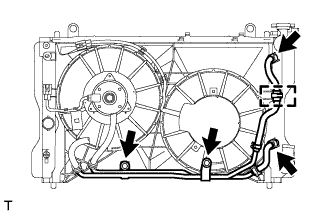 |
Connect the clamp to the fan shroud.
Connect the 2 oil cooler hoses to the radiator.
| 3. INSTALL RADIATOR ASSEMBLY |
Install the 2 lower radiator supports.
Install the radiator assembly with the fan shroud.
- NOTICE:
- Do not apply any excessive force to the cooler condenser assembly or pipe when installing the radiator assembly.
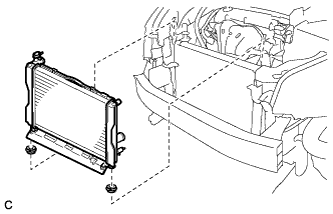 |
Connect the 2 cooling fan motor connectors and wire harness clamp.
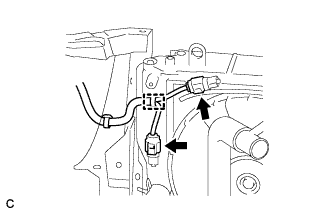 |
| 4. INSTALL NO. 2 FAN SHROUD |
Engage the 2 claws and install the No. 2 fan shroud to the radiator assembly with the 2 bolts.
- Torque:
- 7.0 N*m{71 kgf*cm, 62 in.*lbf}
 |
| 5. INSTALL UPPER RADIATOR SUPPORT SUB-ASSEMBLY |
Install the upper radiator support sub-assembly with the 4 bolts.
- Torque:
- 5.5 N*m{56 kgf*cm, 49 in.*lbf}
 |
Connect the horn connector.
 |
| 6. INSTALL HOOD LOCK SUPPORT SUB-ASSEMBLY |
Install the hood lock support sub-assembly with the 2 bolts.
- Torque:
- 7.0 N*m{71 kgf*cm, 62 in.*lbf}
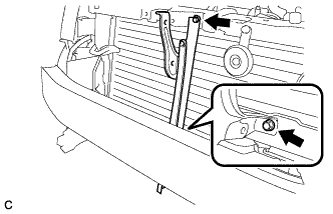 |
| 7. INSTALL WATER BY-PASS HOSE |
Install the water by-pass hose with the 2 clamps.
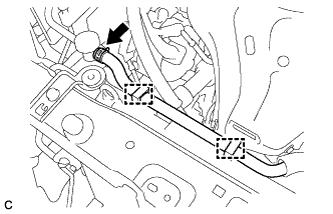 |
Connect the water by-pass hose to the radiator assembly with the clamp.
| 8. INSTALL HOOD LOCK ASSEMBLY |
Apply MP grease to the sliding areas of the lock.
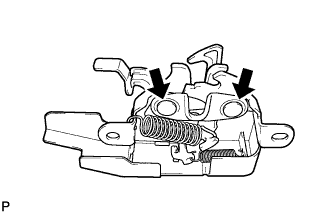 |
Connect the hood lock control cable.
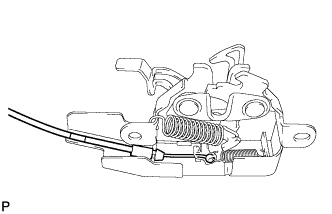 |
Install the hood lock assembly with the 3 bolts.
- Torque:
- Centering Bolt:
- 7.5 N*m{77 kgf*cm, 66 in.*lbf}
- Standard Bolt:
- 8.0 N*m{82 kgf*cm, 71 in.*lbf}
 |
| 9. INSTALL UPPER RADIATOR SUPPORT |
Install the 2 radiator support cushions to the 2 upper radiator supports.
Install the 2 upper radiator supports with the 2 bolts.
- Torque:
- 19 N*m{194 kgf*cm, 14 ft.*lbf}
 |
| 10. CONNECT OIL COOLER HOSE (for Automatic Transaxle) |
Connect the 2 oil cooler hoses to the 2 unions with the 2 hose clamps.
 |
Install the oil cooler tube sub-assembly to the automatic transaxle with the bolt.
- Torque:
- 12 N*m{122 kgf*cm, 9 ft.*lbf}
| 11. CONNECT NO. 2 RADIATOR HOSE |
Connect the No. 2 radiator hose to the radiator assembly with the clamp.
 |
| 12. CONNECT NO. 1 RADIATOR HOSE |
Connect the No. 1 radiator hose to the radiator assembly with the clamp.
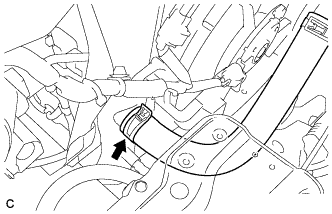 |
| 13. CONNECT RADIATOR RESERVE TANK HOSE |
Connect the radiator reserve tank hose to the radiator assembly with the clamp.
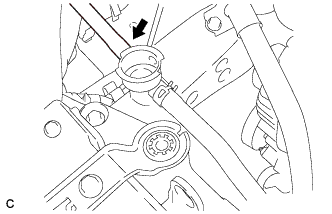 |
| 14. INSTALL THERMISTOR ASSEMBLY |
| 15. INSTALL BATTERY |
Install the battery tray, battery and battery insulator.
Install the battery clamp with the bolt and nut.
- Torque:
- Bolt:
- 6.5 N*m{66 kgf*cm, 58 in.*lbf}
- Nut:
- 3.5 N*m{36 kgf*cm, 31 in.*lbf}
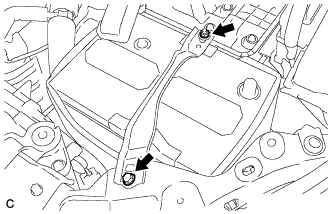 |
Connect the battery cables.
- Torque:
- 5.4 N*m{55 kgf*cm, 48 in.*lbf}
| 16. CONNECT CABLE TO NEGATIVE BATTERY TERMINAL |
- Torque:
- 5.4 N*m{55 kgf*cm, 48 in.*lbf}
| 17. ADD ENGINE COOLANT |
Tighten the lower radiator drain cock plug.
Tighten the cylinder block drain cock plug.
- Torque:
- 13 N*m{130 kgf*cm, 9 ft.*lbf}
Loosen the upper radiator drain cock plug.
Slowly fill the radiator with TOYOTA Super Long Life Coolant (SLLC).
- Standard Capacity:
Item Capacity Engine coolant 5.7 liters (6.0 US qts, 5.0 lmp. qts)
- HINT:
- TOYOTA vehicles are filled with TOYOTA SLLC at the factory. In order to avoid damage to the engine cooling system and other technical problems, only use TOYOTA SLLC or similar high quality ethylene glycol based non-silicate, non-amine, non-nitrite, non-borate coolant with long-life hybrid organic acid technology (coolant with long-life hybrid organic acid technology consists of a combination of low phosphates and organic acids).
- Contact your TOYOTA dealer for further details.
- NOTICE:
- Never use water as a substitute for engine coolant.
Squeeze the inlet and outlet radiator hoses several times by hand, and then check the level of the coolant.
If the coolant level is low, add coolant.
Tighten the upper radiator drain cock plug.
Slowly pour coolant into the radiator reservoir tank until it reaches the FULL line.
Install the radiator cap sub-assembly and reservoir tank cap.
Start the engine and warm it up.
Bleed air from the cooling system.
- NOTICE:
- Before starting the engine, turn the A/C switch off.
- Adjust the air conditioning temperature setting to MAX (HOT).
- Adjust the air conditioning blower setting to LO.
Warm up the engine until the thermostat opens. While the thermostat is open, allow the coolant to circulate for several minutes.
- HINT:
- Thermostat opening timing can be determined by squeezing the inlet radiator hose, and sensing vibrations when the engine coolant starts to flow inside the hose.
- CAUTION:
- When squeezing the radiator hoses:
- Wear protective gloves.
- Be careful as the radiator hoses are hot.
- Keep your hands away from the radiator fan.
Stop the engine, and wait until the engine coolant cools down.
Add engine coolant to the FULL line on the radiator reservoir.
| 18. INSPECT FOR COOLANT LEAK |
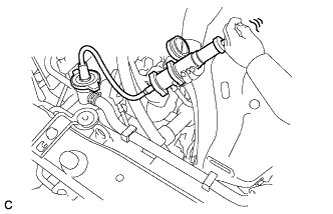 |
- CAUTION:
- To avoid the danger of being burned, do not remove the radiator cap sub-assembly while the engine and radiator assembly are still hot. Thermal expansion will cause hot engine coolant and steam to blow out from the radiator assembly.
Fill the radiator assembly with engine coolant, then attach a radiator cap tester.
Pump the tester to 118 kPa (1.2 kgf/cm2, 17.1 psi), then check that the pressure does not drop.
If the pressure drops, check the hoses, radiator assembly and water pump assembly for leakage. If there are no signs or traces of external engine coolant leakage, check the heater core, cylinder block and head.
| 19. INSPECT RESERVOIR TANK ENGINE COOLANT LEVEL |
The engine coolant should be between the LOW and FULL lines when the engine is cold.
- HINT:
- If it is below the LOW line, check for leakage and add Toyota Super Long Life Coolant (SLLC) or similar high quality ethylene glycol based non-silicate, non-amine, non-nitrite, and non-borate coolant with long-life hybrid organic acid technology up to the FULL line.
| 20. INSTALL FRONT BUMPER ASSEMBLY |
- HINT: